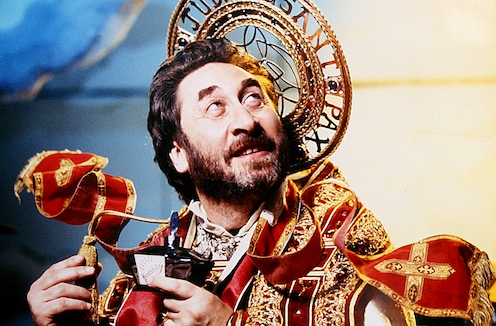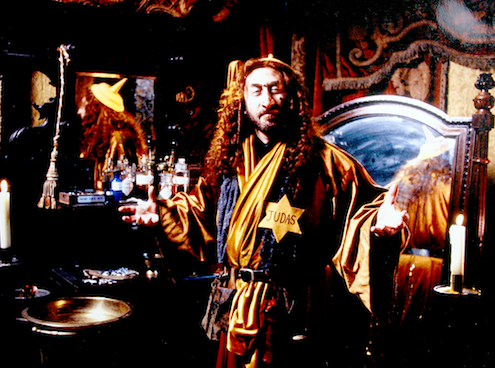Sorry, Judas
Full Description
Who would dare defend Judas Iscariot? Howard Jacobson wants to liberate the maligned New Testament character from his anti-Semitic baggage. In this irreverent and outrageous personal essay and performance, the noted British cultural critic and writer impersonates one of history’s most hated figures, and argues passionately to rehabilitate Judas from his condemned role as the
ultimate greedy betrayer.
Roving through history, literature, art, and film imagery, Jacobson uses his skewering wit and insight to reveal the way that the figure of Judas has been used as a bludgeon against Jews for centuries. Director Celia Lowenstein, originally making Sorry, Judas for Britain’s Channel 4, employs a clever arsenal of visual devices to enliven the argument -- for example, staging a discussion among 12 religious scholars (including Karen Armstrong and the Bishop of Durham) as the tableau from the Last Supper. The Times of London pronounced Jacobson’s work -- a mixture of exquisite bad taste and sterling good sense.
Filmmaker Bio(s)
Celia Lowenstein has made, in the last two decades, over 50 films. Prior to making films she trained as a psychologist, working on how physical beauty is perceived around the world and how distortions of body image can lead to psychological disorders.
After initiating documentaries in the mid-1980’s of her own ideas and working for BBC television in London, she made her first documentary. The film, Let There Be Light, was based on the transformation of physical light into spiritual light through medieval stained glass. Religious themes form an important output of many of her film from the devil - Talk of the Devil, to Santa. Her interest in human psychology has led her to directing biographical portraits of Rudy Giuliani, Nawal El Saadawi, Tomi Ungerer, Isabelle Ebherhardt, Shirley Jackson, Roger Corman and Diane Keaton.
Her interest in science has been the focus of many of her films. These include a portrait of a physicist - Simply Complex: The Life and Times of Murray Gell-Mann, the discovery of a 400 million year old fossil fish - The Coelacanth: The Fish That Time Forgot, and species extinction – Lost Voices. She has also made a film on the human sexual response –The Truth About Sex and the dark world of kleptomaniacs - Dirty, Little Secret. Many of her films bridge the world of science and ideas - The A to Z of Horror, a museum which collects ethnographic material from around the world The Pitt Rivers Museum is…Shut, and a six part series - Philosophy: A Guide to Happiness.
She has travelled to many parts of the world making films about the connections between music, environment and culture - The Girl from Ipanema (Brazil), Eyes Open (Senegal), Like a God When He Plays (Madagascar), Sentimental Journey (Guinea). She has also produced and directed films whose narrative is sung, incorporating techniques found in musicals and dramas – The History of Holland in 1/2 and Hour, Lost Voices, and a musical about madness and mental institutions Bedlam Britannica.
Since dance has featured so strongly in her life she has made films with dancers in The Essential History of France and worked with choreographers Bill T. Jones, Twyla Tharp, Lea Anderson and Bonty Matthias.
She has collaborated with poets Ruth Fainlight, James Fenton and Roger McGough, writers Howard Jacobson, Harold Evans, Annette Kobak, and Alain de Botton; actors Juliet Stevenson and Anthony Hopkins; artists Tomi Ungerer, Leon Golub, George Melly, and musicians from around the world including Yo-Yo Ma, Youssou N’Dour, Justin Vali, Paddy Bush, Miriam Makeba, The Nits, Kayhan Kahlor, Yehudi Menuhin, and Olivier Messiaen. She has made films for the BBC, Channel 4, Arte/ZDF, PBS, Bravo, NOVA and Discovery and has been nominated for an Emmy. She has served on many international film juries and was recently the Granada Artist in Residence at UC Davis. Currently she is artist-in-residence at Villa Montalvo in Saratoga, California and is a grantee of The Christensen Fund working on an initiative on world music.
Celia Lowenstein likes to “bend” the documentary genre, incorporating music and dance with a strong narrative filmmaking style. Sorry, Judas pushes this genre forward and includes documentary filmmaking techniques combined with those used in feature films and musicals. Sorry Judas is seen as too controversial to be shown on American television.
Director(s)
Country(ies)
Language(s)
Release Year
Festival Year(s)
Running Time
51


